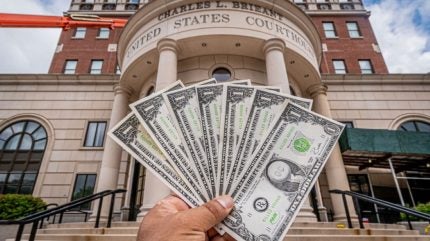
The US Supreme Court has obstructed a settlement that would have shielded the OxyContin producer, Purdue Pharma from future litigation over its hand in the opioid crisis.
The court’s 5-4 verdict reversed a previous ruling that allowed the Sackler family, the owners of Purdue Pharma, to gain immunity by paying a $6bn settlement for thousands of lawsuits surrounding the company’s role in the opioid epidemic. If approved, the settlement money would have been sent to opioid treatment programs and victims of the opioid crisis.

Discover B2B Marketing That Performs
Combine business intelligence and editorial excellence to reach engaged professionals across 36 leading media platforms.
Court Justice Brett Kavanaugh voted in favour of the settlement and said that the court’s decision would have a “devastating” impact on victims of the opioid crisis. On the other hand, Justice Neil Goursch did not support the settlement, writing in an opinion, “The Sacklers seek greater relief than a bankruptcy discharge normally affords, for they hope to extinguish even claims for wrongful death and fraud, and they seek to do so without putting anything close to all their assets on the table.”
A US Congressional committee report had accused the family of playing a central role in the opioid crisis, generating over $35bn in revenue since OxyContin’s market entry in 1996. As per the report, the family has withdrawn $10bn from the company since the drug launched. In 2007, while facing felony charges for “misbranding Oxycontin”, the company admitted its guilt and paid a $600m fine. However, the family confessed that it continued to commit crimes during the following decade.
The same committee accused Purdue Pharma of running an “incredibly destructive, reckless campaign” that targeted high-volume prescribers to boost its opioid sales. The pharma company also evaded safeguards to promote “false narratives about their products to steer patients away from safer alternatives and deflect blame toward people struggling with addiction,” said the former congresswoman Carolyn Maloney, at a 2020 House of Representatives Committee on Oversight and Reform Hearing.
The Biden administration challenged Purdue’s settlement after the pharmaceutical company filed for bankruptcy in 2019. The US government has opposed several pharmaceutical companies in opioid-related litigation during the last two decades. The National Opioid Settlements List names Janssen, Teva, Walgreens, and other companies as businesses that have reached agreements with the US government over their roles in the opioid crisis.

US Tariffs are shifting - will you react or anticipate?
Don’t let policy changes catch you off guard. Stay proactive with real-time data and expert analysis.
By GlobalDataAlongside legal action, US regulators are tackling the opioid crisis in several different ways. Last year, the US Food and Drug Administration approved the over-the-counter use of Narcan (naloxone) to reverse opioid-related overdoses. In recent years, the US Drug Enforcement Agency has also launched Drug Take Back Days to safely dispose prescription drugs.


